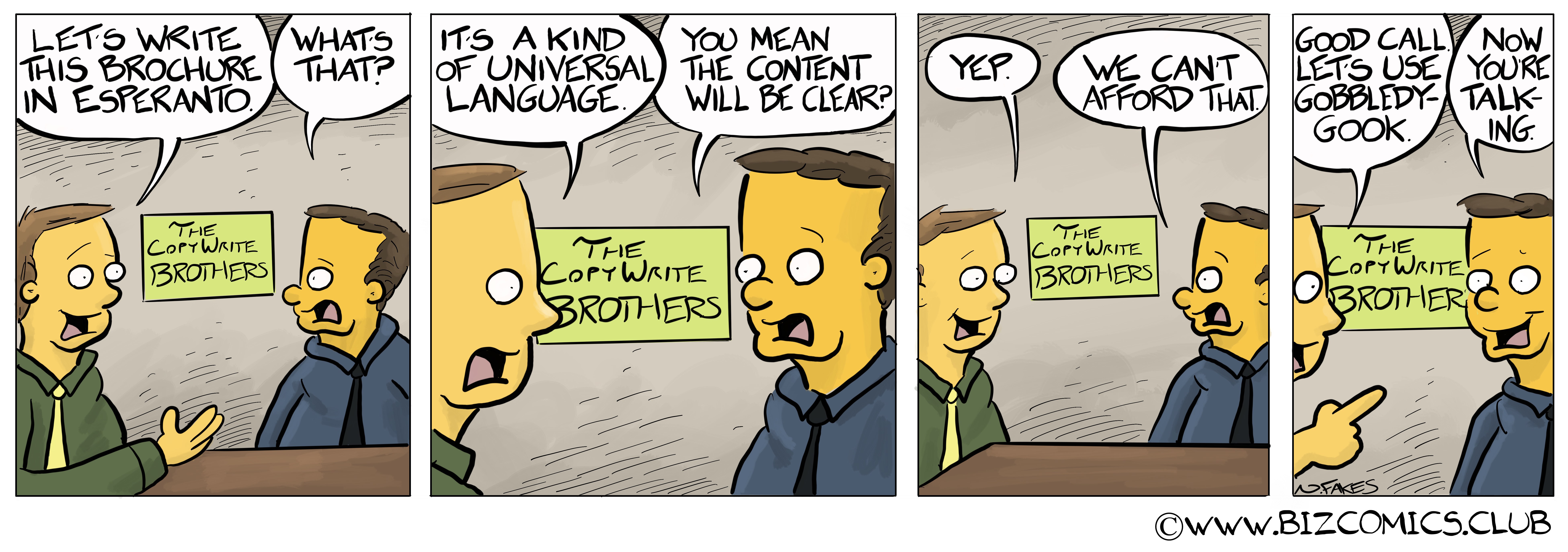Straighten Out the Language

It’s hard not to feel sympathy for Dr. Ludwig L. Zamenhof, the idealistic if misguided soul who created Esperanto.
Dr. Zamenhof hoped to simplify the study and learning of language; to let users of Esperanto communicate with other users of Esperanto, regardless of their nationalities; and to overcome indifference, enabling people to quickly and en masse (or so he thought) learn and use the new language. But he neglected to take one thing into consideration. In fairness to him, he likely never dreamed (or had nightmares about) the prospect that it would come. That one thing is business.
That’s right. In creating the opportunity for even the most feeble-minded among us to create illusions of competence (let alone intelligence or linguistic facility), business created the perfect environment in which language would be misused, abused, stripped of meaning, and generally perverted.
What’s that? You find such a contention dubious? Then try to imagine another context in which the following words — faux verbs all — might have run so afoul of their origins:
Brainstorm: This word used to denote a method of shared problem-solving in which all members of a group spontaneously contributed ideas. Now brainstorming connotes blind groping through any assignment for which the brainstormer is thoroughly ill -equipped.
Larry: “We’ve got to brainstorm on this baby.”
Bert: “Right. We’ve also got to figure out what the hell we’re doing.”
Conceptualize: This word has always been a verb, meaning to form a general idea or understanding, especially one derived from specific instances or occurrences. But so little meaningful understanding exists in most corporate settings that conceptualize now means to think at all … ever … about anything.
Bernie: “It’s hard to conceptualize today.”
Ernie: “Today? I haven’t had a lucid thought in months.”
Dialogue: We remember this word fondly as a noun. Unfortunately, we’re almost alone. In the vernacular of business, it’s now impossible to discuss anything: The best one can hope for is to find a kindred, bureaucratic spirit with whom to dialogue.
Art: “I think we should dialogue with our managers about this.”
Stew: “Okay. But wouldn’t it be easier to have a conversation?”
Dimensionalize: This is a kissing cousin of conceptualize, and it suffers from the same lack of lucidity. To dimensionalize is to attempt to give shape in the imagination to any abstract, amorphous concept about which the dimensionalizer has no clue.
Gil: “Before we can get this baby off the ground, we’ll have to dimensionalize it to a point at which we can explain it to somenone else.”
Bill: “It might also be helpful if we could explain it to ourselves; but we can’t hold up the project.”
Drill Down: Formerly reserved for root canals and mine-shaft rescues, drill down was hijacked by the specialists in every business who make livings without actually doing anything. Drill down often refers to secondary instruction to a subordinate, the necessity of which was occasioned by the specialist’s inability to give clear direction initially:
Boss: “This is good. But can we drill down a bit?”
Lackey: “If I hear what you’re saying, you’re asking if I can go do something you didn’t ask me to do in the first place.”
Boss: “Yup.”
Confucius was once asked how he would restore order to the world. He responded, “First, I would straighten out the language.”
If Confucius is reincarnated, we hope he comes back as a business person.
This content is available for syndication. Please contact us for details.

0 Comments